#but Caesar was dictator of the Roman Republic
Text
Literal March Madness FINAL ROUND
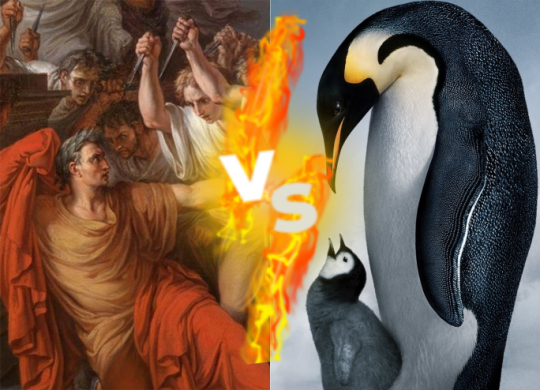
Ides of March. Assassination of Julius Caesar
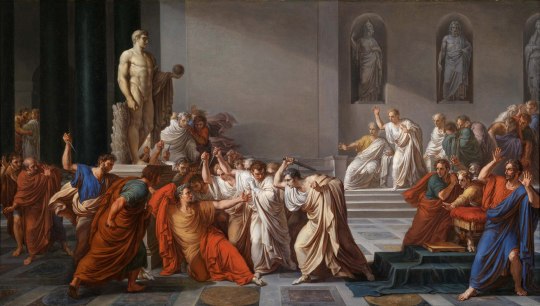
March of the Penguins. Nature documentary about Emperor penguins
youtube
#I would make a joke about Emperors right now#but Caesar was dictator of the Roman Republic#and the Empire wasn't established until after the civil war resulting from his death#really I should have made that joke with the last Penguins matchup#also I only just now noticed that I had spelled 'Emperor' wrong this whole tournament#xkcd#polls on tumblr#poll tournament#poll#polls#march madness#tournament#bracket#march#Julius Caesar#Brutus#Cassius#assassination#Shakespeare#assassination of julius caesar#documentary#penguins#nature documentary#Morgan Freeman#Luc Jacquet#Final Round#March Madness Finale
80 notes
·
View notes
Text
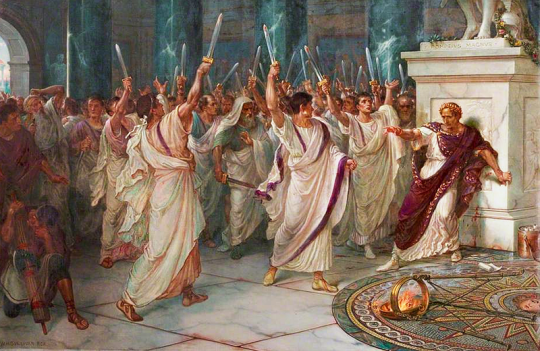
The Assassination of Julius Caesar by William Holmes Sullivan
#julius caesar#assassination#ides of march#art#william holmes sullivan#caesar#ancient rome#rome#roman#romans#theatre of pompey#assassins#conspiracy#conspirators#history#antiquity#roman republic#europe#european#dagger#daggers#toga#senators#dictator#et tu brute#shakespeare#william shakespeare
830 notes
·
View notes
Text
*Ides
Damn autocorrect
#roman history#ancient rome#roman empire#how often do you think about the roman empire#ancient history#julius caesar#pompey#caesar#cato#cato the younger#brutus#brutus and cassius#cassius#dante#calpurnia#Cleopatra#marcus antonius#mark antony#the liberators#pompeius magnus#curia Pompei#theater of Pompey#theatre of Pompey#dying under your rival with his dick out is either humiliating or homoerotic#i can't decide which#et tu brute#ides of march#beware the ides of march#roman republic#roman dictators
33 notes
·
View notes
Text

Haters still Hating….
#humour#memes#gaius julius caesar#the soldiers general#hero of the republic#dictator for life#not a king#rome#roman#i miss the republic#spqr
5 notes
·
View notes
Text
The coming ides of March may have instilled in me a spirit of thinking about monarchies
#like the people loved Caesar but the senate hated him because the republic had been rotten for years#Caesar was a dictator (Roman) but making the republic an empire was probably the best thing that could have happened#thing was falling apart from what I understand#Caesar didn’t doom the republic as much as the fuckers standing against the gracchi brothers did#i don’t know if that’s how you spell it but it’s fine#anyways I have feelings about rome and also about the demonisation of all forms of monarchy#feel like I’m gonna get hanged in public for that but like my interest in worldbuilding#has taken me into learning way too much about statecraft#sometimes it might be better to be able to behead a king rather than people blaming eachother for things oligarchs vote into being#anyways if a single person asks I’ll share a fun idea for a government that won’t ever happen#risks of this post getting deleted in future? moderate
5 notes
·
View notes
Text
for all i love the ides of march memes, something to remember today is that a) killing Caesar wasn't about overthrowing a tyrannical dictator and b) it ultimately didn't save the republic.
a) Caesar was a well liked leader among the common people. he distributed food to the populace, land to his soldiers, and it looked to them like he protected the borders in Gaul. the average person in Rome didn't really care if they were ruled by a senate or a dictator, so long as their lives were tolerable. the senate didn't kill Caesar for the people, they did it for themselves. it was just about putting the power back in the hands of many autocrats, rather than one.
b) Caesar's assassination directly led to TWO civil wars, with Augustus, who inherited Caesar's name, money and soldiers, coming out on top becoming the first emperor. all the damage that was done by subsequent power-mad emperors was his legacy. but if Caesar had just grown old and died in his bed, the republic probably would have reformed in his wake.
in conclusion, if you're gonna violently kill a bad politician, i support you, but please keep the energy up after that and make sure society as a whole gets better, instead of just letting someone else step in to fill the vacuum and continue their shitty legacy.
or, you know, use your access to democracy, which the common Romans did not have, and vote tyrannical politicians out. then make it stick by doing something continuously to help out on the ground.
3K notes
·
View notes
Text
A TV series about the early Roman emperors, except:
It's a comedy.
It starts with Julius Caesar (who keeps correcting the narrator that he's a dictator, not an emperor, as if it makes any difference).
The narrator skips over military campaigns like the Gallic War and Claudius' conquest of Britain in favor of "Haha check out Augustus' shitty poetry" and "Caesar once tried to overthrow the republic with a wardrobe malfunction."
You can tell the narrator gets bored of certain emperors because he keeps going off on tangents about Julius and Augustus after they're supposed to be dead.
The characters get frustrated because they're trying to act out a serious drama but nooo the narrator would rather gossip and it's only 50% in chronological order.
Some of the characters start pointing out things the narrator says that are physically impossible, don't make logical sense, or which their enemies made up.
Tiberius storms out partway through his episode and the rest of the narrative has him played by a sock puppet voiced by Caligula doing a falsetto.
Caligula attempts to sic the Praetorian guards on the narrator for making up filthy lies about him. Like, he's still a huge dick, just not in the way the narrator claims.
Claudius just wants to teach the audience cool facts about the Etruscans but the narrator talks over him.
Nero is actually a Korean boy band singer who keeps trying to explain to people he's a musician, not the emperor, and isn't sure what he's doing in ancient Rome. No one listens.
Galba is played by Rob Halford, the "stately homo of heavy metal."
Galba, Otho and Vitellius have to share an episode, and even then the narrator half-asses it and leaves with 10 minutes of runtime to fill, at which point the characters (including the dead ones) break into the production studio and reveal the narrator is Suetonius.
#jlrrt speaks#suetonius#that prince of gossips <3#the twelve caesars#just roman memes#the twelve caesars is a comedy#jlrrt essays
711 notes
·
View notes
Note
Just curious, why do you think Rome fell?
OMG do you really have to ask such a big question right before I was going to bed anon? Well, here are the primary reasons IMO as a Roman history buff.
Lots of Civil Wars --- The Romans going way back to the days of the Republic were constantly fighting over who was going to be boss. Sulla fought a civil war and took over Rome and declared himself dictator, ditto Julius Caesar, and of course Octavian did the same and became the first emperor. During the empire there were many civil wars over who would be emperor as the Imperial system often lacked rules for succession resulting in dynastic struggles and civil wars. Not that it would have mattered if they did, as they probably would have just ignored the rules. In the 3rd century the empire underwent a 50 year period of near constant civil war known as the Crises of the Third Century. Constantine became emperor after killing all his opponents in a civil war. The later half of the 4th century had more civil wars. Even in the 5th century factions were fighting each for control of an empire that was collapsing all around them. No side wins a civil war because they are bloody, destructive, there are no spoils of war. There is only self destruction, they are about as helpful to a country as would a person shooting himself in the foot. All the money and resources that went into fighting civil wars and rebuilding after the war was money and resources not being used to maintain infrastructure, maintain public works, regulate the economy, defend from outside threats, and maintain the government.
2. Political Instability --- Most emperors did not die of natural causes, most emperors were murdered, or committed suicide, or died in battle, or died in a prison cell. Roman government was chalk full of power hungry psychopaths who were willing to murder their way to the top. Sometimes emperors could come and go quickly, with reigns lasting 2-3 years or less in the 3rd century.
youtube
Roman political history was rife with intrigue, assassinations, and coups occurring all the time. It was like Game of Thrones except instead of lasting 8 seasons it lasted 500 years.
3. The Army Became a Powerful Interest Group --- If you were a Roman emperor the army was a double edged sword. They were good in that they maintained peace and order in the empire and protected it from invaders. They were bad for you in that they could revolt and murder you, replacing you with someone they liked more. Even your own guard, the Praetorian Guards, couldn't be trusted as they could easily slit your throat in your sleep and declare someone else as emperor. To make sure the army was happy, you gave them big pay bonuses called donatives. Basically official bribes paid to keep the soldiers of the army loyal and happy. With each successive emperor the annual donative became bigger and bigger and thus a greater strain on the Imperial Treasury. If an emperor didn't pay up, he could be murdered by his own soldiers. Thus a lot of public money was paid just to keep the army happy so they didn't end up starting another civil war.
4. A Fucked up Economy --- Maintaining a large standing army to defend a large empire is expensive. Fighting civil wars is expensive. Rebuilding after civil wars is expensive. Constant regime change is expensive. Political intrigue is expensive. Eventually it got to the point where there just wasn't enough money to pay for all that. So emperors just minted more money, decreasing the silver content and minting more copper coins until eventually Roman money became worthless.

Today Roman money is still worthless. Go on ebay and find the cheapest Roman coins you can buy. Except for rarer collectibles Roman coins are still very plentiful and thus very cheap to collect. Worthless money made trade and commerce difficult, and thus the economy suffered. Not to mention constant bloody and destructive civil wars were damaging the economy. Political instability also damaged the economy.
5. Growing Disparity in Wealth --- Over time with civil wars and political instability the rich got richer and the poor got poorer. Eventually wealth became so concentrated in the upper class that the middle class disappeared entirely by the late 4th - 5th century. By then the average Roman was in a bad way. They had no opportunities and most Romans were forced to live as tenant farmers, essentially sharecroppers.
6. A Corrupt Tax System --- Meanwhile the wealthy became so powerful that they were able to wield that power so that they did not have to pay taxes. They could exploit loopholes, manipulate laws in their favor, or bribe their way out of paying. To try to make up the revenue, tax collectors attempted to squeeze the lower classes, which of course, didn't have any money. Thus by the late 4th - 5th century the empire was severely underfunded. This resulted in the degradation of infrastructure, public works, the army, the weakening of the government, and less investment in the economy and commerce.
7. Patronage --- By the 5th century the average Roman was out of opportunities and the middle class was gone entirely. More and more the lower class Roman was being squeezed for tax money, money which they didn't have. So in order to survive, Roman lower classes sold their services to a wealthy patron. The patron would house you and protect you and take care of your tax problems. If you were lucky and had special skills like a craftsman or artist you could make a good living under a patron. If not, you probably ended up a tenant farmer tied to the land of the patron, essentially a sharecropper, a serf, or a peasant. Due to this change in the socio economic system power was drawn away from the Imperial government and was redirected to the wealthy patrons. Thus the empire was becoming decentralized.
This would become the basis for medieval feudalism.
8. No One Wanted to Join the Army --- Why would you? You're dirt poor and have no opportunities. If you joined the army you may not even get the opportunity to defend the empire, as you're gonna get killed in a stupid civil war fighting a fellow Roman who is also dirt poor and has no opportunities. Your government is corrupt, your emperor is a snobbish entitled incompetent dipshit who was out of touch with reality, the tax man is trying to squeeze you for money you don't have, you have no rights, you've been forced to become a peasant to a proto-feudal lord, and it is clear the empire is dying. By the mid 5th century most Romans were like, "let it fucking die". As a result, the army suffered severe manpower shortages. Right at the time when Goths and Franks and Vandals and Huns are going to start swarming into the empire.

These to me are the primary reasons for the fall. Anyone have anything else to add in addition to this?
299 notes
·
View notes
Text
Kneel to the Empire or die with the Republic

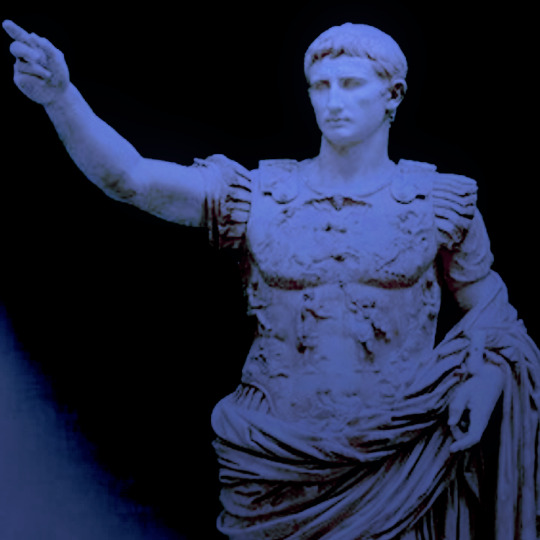
A woman cannot be left alone to her own fate. After the fall of what you used to know, your only option was to kneel to him.
pairing: Young!Gaius Julius (Augustus Imperator) x Fem!reader
warnings and a note: angst, grief. This story is based on Domina (tv show), I don't have so much knowledge about the historical facts that involve Augustus, so, for those who have more baggage I'm sorry if something sounds wrong from what happened, please be kind, or just don’t read. English is not my first language. 3,8k
In addition to grief, other factors tightened your chest after your father's death. A good man, a faithful supporter of the Roman Republic and power of the Senate, a patrician descended from an important aristocratic lineage, and the most aggravating: one of those responsible for orchestrating the assassination of Gaius Iulius Caesar.
When the military forces of Gaius Julius, born Gaius Octavius, great-nephew of Julius Caesar, began to act in Rome, you knew you had few certainties and much to fear. Perhaps you were executed with your family, dying in an honorable way and with your head held high against a dictator (in the words of your older brother), or just having your traitorous blood eliminated by the defended cause of the heir of the most important man in Rome. They said he was different, a restorer of the Republic, a supporter of power in the hands of the people and the Senate, a middle ground between Caesar and the most avid Republicans. In those days, nothing was clearer to you than your death, however, Gaius Julius' stroke of mercy in sparing women and children from those considered enemies was at the same time a breath of relief and a punch in the lung.
Relief to the fact that you would have a chance to live, since the fear occurred when your brothers did not have the same luck when they were sentenced to death.
"What are we going to do?" You asked scared.
The two looked at each other for a considerable time, with Nero lowering his head before answering: "you will stay here and we are going to fight.”
“What? I can't stay here! There must be somewhere where his men don't find us."
"And how would you live? Running away forever? It's not the fate our father wanted for you." Claudius said.
"That's exactly what he would do instead of kneeling to a dictator, what do you expect me to do?"
“We are trying to protect you! There is no gentle future beyond these walls and I’m sure that Julius' men will still be less kind if they capture you," Nero said, exalting himself before holding your hands: "we cannot risk your life beyond ours, our father is not here, our allies are almost all dead, there is no hope for the three of us, but there may be for you."
The fall of tears marked your face until they flowed into the union of your hands. “I don't want to be alone,” you whined.
"You won’t”
It wasn't known at the time, but that was the last time you were with your brothers. The soldiers of Gaius Julius broke into your house the same night, looking closely for any fresh trail of male presence. The soldiers responsible for your safety were murdered without any chance of defense, with the exception of those who submitted quickly, fearful for their lives. You didn't judge them, how could you, after all?
When a man pressed you incisively on the whereabouts of your blood, shaking your shoulders rudely, an authoritarian voice interrupted him with a short message:
"Not her."
With wide eyes and irregular breathing, you were released immediately. The violence on the inside was mirrored on the outside, being the clearest reminder of those destined to die with the Republic. Your inert body remained in the sights of the man who guaranteed your release, the same facing you a few seconds after his order.
“My men will do your protection tonight,” he said.
The confusion in your frightened face was clear on the tip of your tongue when you asked a simple question:
"Why?" That didn't happen to other women.
"You'll know at the right time."
That's all the man said.
You remained static for long minutes after the departure of those who vandalized your home, with your father's servants — ordered by them — to remove the corpses from the house and sanitize the rooms to their original. Impossible. Doesn’t matter if the blood is removed, the death will be marked forever in each piece of furniture and corridor. One of the soldiers responsible for "your protection" approached with fear and touched your arm with delicacy, hitherto unknown to you, to get you out of the trance.
“We will assume from here, go back to rest,” he said.
"What's going to happen?" Your question was weak, almost like a meow.
"The house will be cleaned and the perimeter protected."
"From who? Why do you want to protect me?"
He remained silent for a few minutes before answering: "I'm not allowed to say."
Permission? What was going on? What was being planned for you? And by whom? Gaius Julius himself or one of his trusted men? Would you be held hostage? Would you marry any of them? Would it be sold as a slave or prostitute?
The rest of the night was spent in torment, with you pushing the internal lock of your door hard and putting on a clot to try to hide some jewels and coins with you in case you needed it and managed to escape. Sleeping was not an option, but a part of you wished that sleep would erase the horrors experienced and the departure of his brothers, so nervousness and fear partially succumbed to sleep. You allowed yourself to stay in the room a little longer that morning, ashamed of facing your servants and guards (no longer yours, but of the men of Gaius), only to receive a knock on the door of the same man you spoke to for the last time.
“I would like to sleep a little more,” you said through the door, afraid enough to open it.
His breathing was perfectly audible, followed by a moment of silence. "You will have some time, but you will need to leave soon to feed yourself and receive the lady Octavia's visit."
Octavia? Octavia Minor? Brother of Gaius Julius Caesar Octavianus? What the fuck was going on?
If there was any pretension of tiredness in you it was in a distant past, your mind had just been set on fire with what was going to happen, with what that woman might want with you. She was no stranger, visually speaking, since the glimpse of her red hair and elegant posture were seen by you at the wedding of Livia Drusila and Tiberius Claudius Nero. She, Scribonia, Marcus Vipsanius Agrippa and him, the reason for everything that is happening, with his hair and eyes dark as the night, with cheap charm and indecent actions.
You didn’t forget how you caught him having inadequate relations with Cicero's wife during the celebration, how he didn’t seem intimidated or embarrassed by his wide eyes, or how he went to you discreetly after your escape, so calm and carefree that it seemed unreal.
It's too unreal to have him by your side. Too unreal that he approached the daughter of one of the men responsible for the death of his great-uncle.
“I'm sorry you saw that, I should have chosen a place with a door,” he said when he settled comfortably standing next to him.
Your breath froze when you heard such a lack of respect, was he making fun of you?
"Don't worry, the time will come when you will do that for your husband," he provoked again, not receiving silence in response.
"Have you finished yet?" Your question was irritated, although low, without looking him in the eye.
"Yes, I did."
You didn't notice his pertinent choice of words, keeping yourself in the same place while waiting for him to leave.
“A beautiful thing like you deserve a better husband than Livia's,”
And so, he left your side.
Everything that preceded your departure from the room to the bath and to the food resulted in a constant tension in every room of your house. You felt eyes accompanied by you at all times, both from the soldiers of Gaius and from your father's slaves. It seemed that another series of murders would happen and was only prevented, for the time being, by the visit of the dictator's sister, which happened in the early afternoon.
A comforting smile directed to you was present before and after the hug given. "I'm sorry for what happened yesterday, the war usually gets the best of us."
That couldn't be said to her, you thought.
“Thank you.”
One of the guards guided the way to his father's conversation room, where there was some fruit and wine waiting. Quick flashes of happy memories made you walk slower before sitting next to her, it seemed like an eternity from full happiness, and maybe you would never fully recover it.
“Your house is quite beautiful,” Octavia began, looking around, “I always imagined it was, but it's different when being inside.”
“Has had better days,” you said apathetic, looking down.
Holding your hands, she held your chin to face her. “Again, I'm sorry for what happened. It has been a difficult period for all of us, on both sides, and I imagine that being alone in a world of men is more aggravating. That's why I'm here." Your silence made her continue, although she did not mention of stopping. "I believe you follow your father's ideas, perhaps not because you understand what a republic means, but because you accept what your blood believed-"
"I know what the republic means, just as I know what your brother is doing, but I don't think he came here to ask for my opinion," you interrupted her.
“Not an opinion, but a decision,” she rectified.
“And what decision is that?"
She looked down, displaying a strange smile as she took a deep breath. Her response took a while, as Octavia calmly took a bunch of grape in her hands and picked up a berry before resuming the subject.
"Your father's decision to delay choosing a suitor for you was quite risky for your reputation, rumors could have been made about your purity instead. I like to think he was kind, to the same extent as a fool. But maybe, all this time serves a greater purpose,” she took another break, waiting for you to guess, but everything seemed too absurd to unravel.
"What purpose?"
"A woman cannot be alone in the world, especially one with your birth. When the news that your brothers are gone is spread, men of all regions and ages have prowled your carcass and will force a marriage to get your dowry. Maybe some of your uncles or cousins, or any of them. I come here today to offer a better proposal than any of them: Gaius."
The self-control over your expressions was not well executed, since your eyes frowned and your mouth opened. No, it couldn't be. It was a fucking joke. How... how dare she?
"What?" You asked out loud. “Gaius? Your brother Gaius?"
"Yes, he in person." Octavia answered.
“Why? Why do you want me to marry him? Why me?"
“Although many claim that Gaius intends to end the Senate and Republic, this has already proved to be a fallacy. In his trajectory, he showed that he did not conquer power alone. In fact, the Senate is on its way to deliver this power to him, because it recognizes his virtues. He is a merciful man, who wishes to restore the Republics to their glory days.”
“Merciful?” You asked. “Where is the pity in sentencing my brothers to death? How nice would it be to marry the heir of the man my father helped kill? How good would it be to marry the man who is the reason why all this is happening?” Your voice came out exalted again.
Octavia, in turn, restricted herself to looking down. “All the men who remain in Rome will be supporters of Gaius, maybe yes, some dissatisfied rebel can remain, but in the end, their opinion will be worth nothing, so any husband they arrange for you will be loyal to my brother, it’s no less worse.”
“Gaius decreed the death of my brothers, that’s bad enough,” you answered.
“But what will be worse for you: to be unhappy with a bad stranger or to be the wife of a young sovereign leader? My brother was not very favorable to your family, but he would not do the atrocities that could happen to you being alone and vulnerable at this time.”
No answer was formulated by you, maybe a punch in the stomach would be preferable when facing your reality.
“Gaius himself suggested this idea,” she added.
Before or after declaring your brothers as enemies? How could he think of something like that? The memory of your family and your dignity was insulting! You would become what you wouldn’t like to say and that your father would vehemently deny.
“It’s a lot to assimilate, I know, so you have until the rest of the day to think about, tomorrow one of the soldiers will take your answer in writing,” Octavia said.
“No,” you said. “I’ll come to you. Papers can be tampered with, not my word. But I ask you to order your brother’s men not to touch any woman in this house during my absence.”
“I’ll be waiting.”
It was a deal. A marriage proposal by Gaius Julius Caesar. Not a request, an agreement, that’s what it was, an arrangement to improve his image. That was your function, to improve the lives of men, and unfortunately, even if you don’t choose it, there is no way to get out of this situation unscathed, because Octavia didn’t lie when she referred to the fate that awaited you. But that was worse, he was to blame for the chaos and violence that Rome witnessed, the reason why your home was destroyed. You were truly scared between choosing such options. They were all bad in many ways, but Gaius’s was disrespectful and humiliating. And yet you were still considering it. Was surviving so important?
Or was it that you were too cowardly to face your destiny. Between running away and getting married, you preferred death, but you were too cowardly to cut your throat. Maybe one of Gaius’ men could do this after you rejected the proposal, or Octavia herself could meet someone who messed with poisons. By the Gods, you were desperate.
“I don’t know what to do,” you told a personal servant while bathing.
You still didn’t know what to do when you went to sleep, when you woke up the next day, when you ate nothing more than a few grape berries, when you were taken to where Octavia was and when you faced her. You believed that years could pass and you would not yet have a concrete answer to that situation, but even so, the known evil (Gaius) seemed less worse than what could happen if you rejected it.
Even though it is a simple word, it has never been so difficult to make a statement before.
“Yes.”
You accepted him as yours.
Gaius’ sister’s smile was warm, wrapping your body in a hug while saying that from now on you would be sisters. Your dresses and goods would be sent to your new home, and a few maids could be taken too — at your insistence.
“We have our trusted servants, no need to worry,” Octavia said.
And then it became clear that the evaluation of his company was not only for capacity, but for loyalty and security.
“Gaius will be back soon, I’m sure he will be pleased with your presence here,” she said next. “You couldn’t have chosen better.”
Choices. No, you didn’t want to keep torturing yourself by thinking about the other options.
However, a curious fact was noticed by you in the days that followed in Gaius’ house, under the company of Octavia and other ladies: they would die to be in your position. Or rather, they would kill to be the wife of the next leader of Rome. It was one of the certainties you came to believe, Gaius Julius would not lose the war and those women would do anything to be in youe place. The feeling of danger that filled you on the other days was terrifying, restless and too tense to remain surrounded by other people. Turning to Octavia about the possibility of being poisoned, she eased your fears by saying that everything that arrived on your plate was tasted by others noticed. It wasn’t so comforting when you realized that people could die for you. No, that was insanity. Everything related to what you were living was insanity.
Long days and long nights were bathed in fear in your new home, but nothing compared when the news of his return echoed through the walls. Next to your faithful friends, men, family and servants, there you were, in the center, next to your new sister. The smile that stamped his front was raised when he saw your serious and nervous figure waiting for him. The son of a bitch looked like he had won the biggest of the prizes. And in fact, he did it, after all, his image was built for that.
For the reconstruction of the Republic.
No word of his speech was heard by you, just waiting for such torment to end. But the celebrations were just beginning. At first, he did not go directly to meet you, but in the middle of the night, when you were away for too long in a distant room, he approached surreptitiously with gentle steps.
“Even though it was a generous proposal, a large part of me thought you would refuse it,” he said, calm with a breeze.
A sigh was your first reaction.
“A large part of me thought about refusing.”
He stood next to you, or in front of you (depending on the perspective) in the hallway.
“And what made you change your mind?”
“I don’t know,” you replied.
“Don’t you know?”
“No, I don’t know.”
“So why are you here?”
“I was afraid of being alone, not that I’m not at the moment. Not that the other option was less worse, in fact, both were bad enough.”
“And what was the other option?” He asked with a mixture of humor, surprise and curiosity with his sincere answer.
“Your sister can answer that.”
He didn’t hold his smile this time, even if weak and nasal. After that, he was silent for a while, posture changing up before speaking even lower:
“I’m sorry for your brothers.” Perhaps it would have been better to have been silent since your only reaction was to walk in the same direction that he came, leaving him behind, or trying. “Wait, wait! I’m sorry, it was something stupid to say.” He held your arm firmly, but without being rude, as he got even closer.
“Yes, it was,” you agreed and showed the frown you fought so hard to disguise.
“There was nothing to do about them,” he confessed.
“No? Did your supporters say that or was it your idea to declare them as enemies?” You asked (accused) him.
“Would they accept to be loyal to me?”
Of course not.
“I thought you was doing this for the people and the Senate, to restore the Republic,”
“And I am, but would they accept this if it was done by me?”
You smiled with mockery, looking the other way and leaving him unanswered.
“I know you have enough reasons not to trust me, or hate me, but I don’t intend to fail as a husband, and I don’t intend to disrespect you,” he said, trying to soften.
“Just like you disrespected Cicero?” You remembered the incident at Livia’s wedding.
It was his turn to sigh, releasing your arm to hold your hand.
“Cívero married her because her family is rich. That’s why everyone gets married: money, power and family. That the only thing that’s matter.”
“That’s why we’re getting married. Money, power and family,” you said bitterly.
“Yes, it’s. But I know it wasn’t an easy decision fot you to make.”
If your conscience wasn’t trying to push him away, you could have noticed a certain compassion in his beautiful eyes.
“No, you don’t know. You don’t.” That was too much, no, it was an excess of what you could handle. “You have no idea what it’s been like to live with this burden. The people I loved are dead and I feel that at any moment I will be next, and I will still marry you. No, you don’t know how I feel. My father would bitterly deny me if I were alive, my brothers too, because I’m going to marry you, because I’m a fucking traitor!” Tears collapsed violently from your eyes. “Because I have nothing else, there’s nothing left.”
Oh no. He advanced on you with a tight hug, holding your head against his chest. “It’s ok, it’s ok, you’ll be fine, I promise, I’m sorry, I’m sorry for all this. I promise I won’t betray you, I promise, I’m sorry.”
You didn’t know how many tears you had saved for that moment, for him. Because of him. You couldn’t imagine leaning over to seek comfort in him, squeezing him so hard to prevent him from running away. But he wouldn’t go anywhere, no, he wouldn’t. He wrapped you in a cocoon while holding the back of your head. The inconvenient thought that incriminated him for your situation was unpleasant to deal with, for him, and unconsciously, for you, a small relief was present in the back of your mind because no one was around.
“I promise you, nothing less than respect. I can’t get back what was lost, but I can guarantee new things,” he said when you calmed down.
“I don’t need jewelry, Gaius, or dresses, or maids. I already have that, I’ve always had it,” you countered it.
“I’m not talking about material goods. Some things need interference to be solved, others can be remedied by time, or mitigated. I don’t intend to put pressure or do little of you, I know it wouldn’t work, and that’s not how I want to solve things between us. I hope one day you can forgive me, I’ll be waiting for that.”
Taking a risk by kissing your forehead with affection was dangerous, but touching your lips was off limits. He has waited so long for you, since he saw your wide eyes and beautiful face at Livia Drusilla’s wedding. A beautiful girl from an important family, the same family involved in the size of her great-uncle, yet a beautiful girl to have by his side. He knows it was cruel to have made such a proposal, but it would be even more cruel to leave you for your luck. He could not allow this, not when your fragility was exposed to him in a more frighteningly palpable way, not when even in suffering you confronted him. Call him a fool or hopeful, but he believed that eventually, taking time or not, you would be totally his.
The confusion was evident in your eyes when he felt for the first time the slight landing of soft and gentle lips against your own. His lips... kissing you. Your eyes closed in the final seconds, before a whispered statement was sworn to you in a serious and masculine tone:
“Everything will be fine.”
————————
I didn’t like this as much as I imagined.
general taglist: @chompchompluke
tag for this fic: @lovelykhaleesiii @arcielee
#gaius julius x reader#young!gaius julius x reader#domina hbo#tom glynn carney#gaius octavius x reader#gaius julius caesar#emperor augustus#fanfiction#tom glynn
414 notes
·
View notes
Text
One day someone will make a series/musical a la hamilton/ofmd about the late roman republic and everyone on tumblr will hail it as a second coming of christ and there will be gay fanarts of pompeus and caesar intensely kissing and they'll make sad poetry about cicero after the death of tullia and clodius will be turned into the slutty fun uncle that is going to be drawn with the beans style mouth and catullus will be the poor little fandom meow meow and everyone will be so obnoxious about it till the natural cycle of tumblr favourite shows about historical figures will occour and people will start discourse like "isn't cicero a literal slave owner??" "It's kinda fucked up that someone is showing dictator and warmonger caesar in a blorbo way" and it'll be put on the irredeemable media lists and people will have "if you like Roman Late Republic Show DNI!!!"
120 notes
·
View notes
Text


Ancient Roman Temple Where Julius Caesar was Assassinated Opens in Rome
The square contains the remains of the Curia of Pompey, a central meeting place for senators where Caesar was stabbed to death on the Ides of March.
An ancient square where historians believe Julius Caesar was stabbed to death — one of the most infamous assassinations in history — was opened to the public for the first time Tuesday.
The Sacred Area of Largo Argentina, containing the remains of four ancient temples in a bustling part of downtown Rome, can now be seen up close via a lowered walkway for 5 euros ($5.50).
The site also contains the remains of the Curia of Pompey, a central meeting place for senators where it is believed Caesar was stabbed to death on March 15 (the Ides of March) in 44 B.C.
Successive generations had built on the site since ancient times, and it was only rediscovered when buildings were demolished in 1926. Three years later, another dictator, Mussolini, inaugurated it as an important historical site.
Two new exhibition areas also document the many archaeological finds at the site over the ages. The works were funded by the fashion house Bulgari and managed by the Capitoline Superintendency for Cultural Heritage.
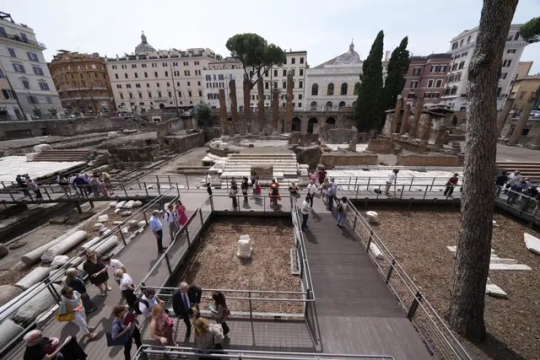
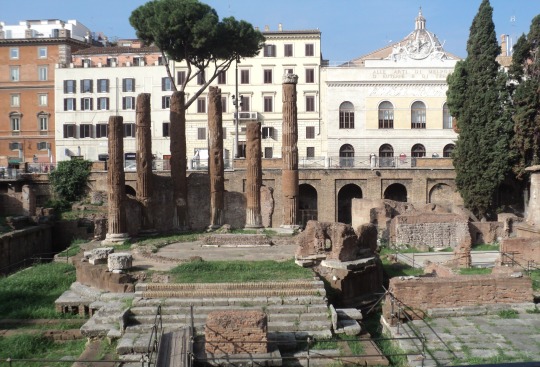

The site could previously only be seen from street level and had become overgrown with weeds. Tourists’ photos posted online show the area being enjoyed by stray cats — there is cat sanctuary on a corner of the square.
“One of the most beautiful and precious places in Rome is finally fully usable by Roman citizens and tourists, who from now on will be able to see from nearby wonderful archaeological finds from various periods of the history of our city,” Miguel Gotor, councilor for culture for the city of Rome, said in a news release.
The first recorded structure of importance on the site dates to the early third century with the construction of what is referred to as Temple C, probably dedicated to the Roman goddess Feronia.
Fires in 111 B.C. and A.D. 80 destroyed much of the earliest buildings, with those remains buried under a new floor built by the emperor Domitian in the first century.
Caesar's death has endured in Western culture as one of the most seismic political events in history, even as its details and wider implications continue to be debated.
In Shakespeare’s dramatic retelling, the dying dictator last words were “Et tu, Brute?” after he saw that his old friend Marcus Brutus, one of the murder conspiracy’s main ringleaders, was among his killers.
What is agreed upon is that Brutus and a group of Roman senators had grown concerned over the size of Caesar's power and influence and his undermining of the Republic.


However, Caesar's killing unleashed a period of reprisal and civil war that killed thousands and effectively killed the Republic. His named successor, his adopted 18-year-old son, Octavian, became what is regarded as Rome's first emperor in 27 B.C., known by then as Augustus.
Such is Italy's vast wealth of archaeological treasures that many important sites have yet to be excavated and thousands of found items have never been put on public display.
Historians' understanding of ancient Rome is still evolving as more items are found. In April a new study shed light on the use of Roman wineries in theatrical ceremonies, while in May archaeologists revealed how people were killed in an earthquake triggered by the immense eruption at Vesuvius in A.D. 79.
By Patrick Smith.
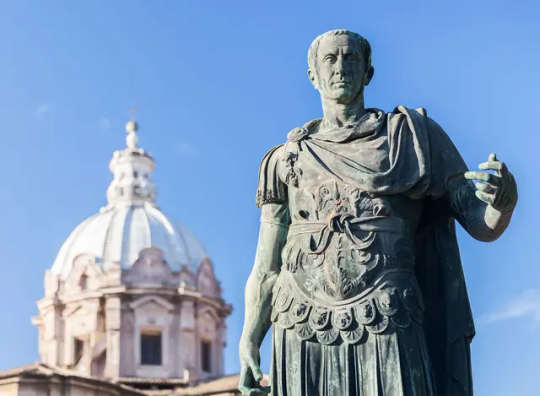

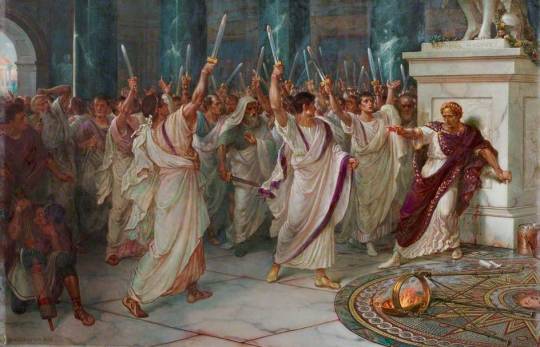

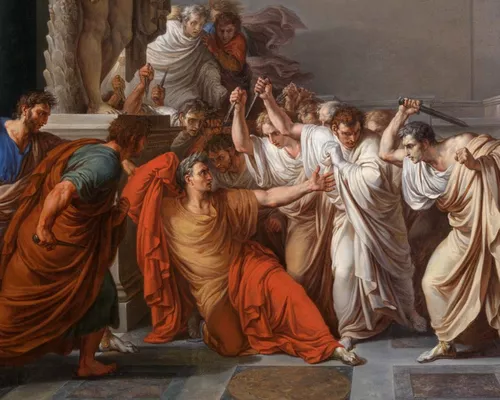
#Ancient Roman Temple Where Julius Caesar was Assassinated Opens in Rome#Curia of Pompey#The Sacred Area of Largo Argentina#Ides of March#ancient artifacts#archeology#archeolgst#history#history news#ancient history#ancient culture#ancient civilizations#ancient rome#roman history#roman empire#roman ruins#roman art
186 notes
·
View notes
Text
Who puts the dick in dictator?
#lucius cornelius sulla#sulla#gaius julius caesar#how often do you think about the roman empire#julius caesar#caesar#Cincinnatus#lucius quintus Cincinnatus#Cincinnati#my roman empire#roman history#ancient rome#roman empire#ancient history#roman republic#dictators#Roman dictators#the dictatorship#ides of march
14 notes
·
View notes
Text
Yan!Julius Caesar Random Headcanons
❝ 📜— lady l: I love writing these random headcanons and if you guys want more historical characters feel free to send them! If you're curious about how he is yandere, I posted a general headcanon of him, which you can read by clicking here. Here are historical facts and some additional ones from my head. I hope you like it and good reading!! ❤️
❝tw: not entirely historically accurate and perhaps murder (?).

Julius Caesar was born in 100 BC and became an important Roman military and political leader. His conquest of Gaul (present-day France) and his successful campaigns contributed to his rise to power.
In 44 BC, Julius Caesar was appointed dictator for life by the Roman Senate. This move sparked concern among senators, leading to a plot that resulted in his assassination on March 15, 44 BC, known as the "Ides of March". The man did not last long as a dictator.
Julius Caesar played an important role in reforming the Roman calendar. The Julian calendar, introduced in 45 BC, was an adaptation of the lunar calendar to the solar year, forming the basis of the modern Gregorian calendar. So much so that the month of July is in his honor.
Julius Caesar formed a political alliance known as the First Triumvirate with Pompey and Crassus. They shared power and influence to advance their political and personal agendas. It didn't last long because soon they started fighting each other for power. A yandere obsessed with power, I dare say.
Julius Caesar is known for writing "Commentaries on the War in Gaul", also called as Commentarii de Bello Gallico, a series of accounts of his campaigns in the region. These writings offer valuable information about military tactics and life at that time. A great military commander and also a great fanfic writer.
There are reports that say that when he was 30 years old, he passed in front of a statue of Alexander the Great and wept because he had reached the same age and had not conquered as much as the Macedonian King. An inferiority complex, I would say.
The title "Caesar" became a dynastic name used by many Roman leaders after Julius Caesar. The first Roman Emperor, Augustus, was his nephew and adopted heir, and he adopted the title "Caesar" as part of his name. A curious fact is that many Brazilians have Caesar (César in portuguese) in their name.
In addition to his military achievements, Julius Caesar had a deep taste for literature and writing. He frequently exchanged letters and discussed poetry with various intellectuals of the day. A true cultured man and a renaissance ahead of time.
The death of Julius Caesar was one of the key events that contributed to the fall of the Roman Republic and the subsequent rise of the Roman Empire. His legacy has had a lasting impact on history and politics. Our man is credited as one of the greatest military commanders of all time.
Rumor has it that Julius Caesar had a secret superstition of avoiding black cats, believing them to bring bad luck. This contrasted with his image as a fearless leader. Poor kitty, so many powerful men were afraid of cats.
#history#yandere historical characters#yandere julius caesar#yandere julius caesar headcanons#julius caesar#headcanons#yandere headcanons#yandere history
138 notes
·
View notes
Text
Reflections on the Ides of March
After all the excitement yesterday about the assassination of Julius Caesar, I think it's worth mentioning that Julius Caesar's death being celebrated as the common man's answer to tyranny is a little like celebrating the Mayflower Pilgrims for being on the side of religious tolerance.
Like, the Mayflower Pilgrims emigrated from England because England wasn't religiously controlling enough for them. They wanted more religious tyranny and were upset that the government was too moderate for their liking in allowing other ways of life.
In a bit of a distant parallel (bear with me, ADHD connection brain go brrrr) Julius Caesar first made enemies among the aristocrats who eventually murdered him by being a populist endeavoring to solve Rome's growing inequality issues by bringing land reform to Rome specifically targeted at redistributing land that had been gobbled up by the rich and powerful to give it back to its people.
It's a little complicated because, yes, Caesar's move to dub himself dictator for life was absolutely an authoritarian move. In addition, Augustus and subsequent European authoritarians/monarchs (I believe we should use the term more interchangeably tbh) used "Caesar" as a title and justified their reign going back to him via Augustus's eventual ascendence as his heir after a bitter power struggle and killing off all his other rivals who could claim that title, and thus brought an end to the (already tottering) Roman Republic. This puts Caesar as a step on the path to a reduction of a form of non-authoritarian rule.
But tyrant, as Caesar was referred to by those who assassinated him, in the ancient sense had a subtly different meaning. A tyrant was usually a figure who gained popularity among the masses by becoming their advocate against the rich and powerful and who ascended to power usually on the wave of a cult of personality and promises of egalitarian reform. They rarely established dynasties because the skills needed to reach their position of power rarely appeared in their biological heirs and without the structure of a monarchy to pass that mantle of authority onto their sons and heirs, the power structure of that tyrant usually fell apart upon their death.
Basically, one really magnetic person would occasionally rise up when the rich and powerful had gone too far in the societal imbalance. Rich aristocrats hated that. The enemy of most classical tyrants were the rich and powerful. Tyrants were populist leaders who usually took power for life (often, a rather short one if they couldn't keep the reins of power well in hand). This is a part of the rather complex political history of "rule by the people" and how it wasn't always a straight line from "rule by one" straight to democracy, sometimes a single authoritarian dictator/tyrant actually was the representative of the common man in confrontation against the accumulation of power by oligarchs.
So, Julius Caesar is a bit of a complicated figure here, because he rose to power by being a champion of the common man, in a tradition in Rome going back to the ill-fated Gracchi. By taking "dictator for life" powers, he was feared to be setting himself up as a king, or rather as a tyrant by Roman Senators, all wealthy aristocrats and by today's standards, oligarchs. Rome originally became a Republic, historically, when a Brutus family member assassinated the then-Etruscan tyrant so Rome could rule itself (or rather, could be ruled by its own oligarchs, which was much more democratic before it exploded into an empire by Caesar's time).
But the material damage the Roman Senators feared from Caear was just as much that he would take their land and money from them with that dictatorial power in order to repair the desperately crumbling "middle class" (term used loosely as it does not directly translate) which had been picked clean and robbed blind by the aristocrats over the past century or so in Rome since the Punic Wars. Caesar was championing anti-poverty measure that was looking out for the actual common citizens of Rome, something the Roman Senators did not want Caesar to do because it would bite into their wealth.
This makes it rather bitterly ironic that the common people today celebrate Caesar's death when, at the time, one of the reasons he was murdered was for being the champion of the common man. However, it is an understandable irony given how Caesar's legacy would be used by authoritarians after his death, up to and including in modern times.
#history#julius caesar#tagamemnon#ancient history#ancient rome#look any classicist is gonna spot all my oversimplifications here#this is a 101 Classics point I'm making so please no pedants in the comments
243 notes
·
View notes
Photo
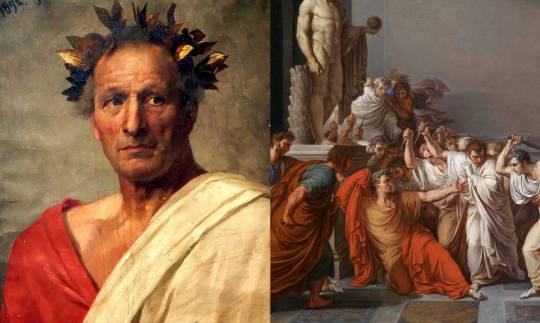
The Ides of March. On March 15,44 BC, Julius Caesar was assassinated.
We owe Julius Caesar the famous phrase “the die is cast” (Alea iacta est). He said this in January 49 BC when he led his army across the Rubicon River in northern Italy, after his conquest of Gaul. A positive aspect of him is that he did not seek revenge. He spared the lives of his enemies defeated in the civil war with the intention of turning them into friends and together improving what he called "the new Republic." Among his murderers on that Ides of March were those "friends" whose lives he had spared.
In 59 BC he founded Florentia which later changed its name in Italian to Firenze (Florence). The curious, almost prophetic thing is that Florentia in Latin means “flowering” and it was in Florence that the cultural movement known as the Renaissance (a flowering of art) emerged.
In 46 BC he modified the Roman calendar, creating the novelty that the year began on January 1 and not March 1 as in the previous calendar in addition to the novelty of the leap year.
Julius Caesar, one of the most famous men, had a passionate relationship with one of the most famous women, the Ptolemaic Egyptian queen Cleopatra VII. They had a son, named Caesarion. After Cleopatra's arrival in Rome in the year 46, Caesar himself officially recognized the child as his son.
He had a daughter named Julia, whom Caesar married to Pompey Magnus, who would later be his greatest rival and whom he defeated during the civil war at the Battle of Pharsalia. Julia and the baby died during childbirth. Caesar adopted his grandnephew, Octavian as his son and sole heir. Years later, Octavian ordered the execution of young Caesarion, days after Cleopatra committed suicide.
Caesar proclaimed himself Dictator for 10 years, something completely unusual. The position of Dictator was an occasion in which a man was elected by the Senate for a period of 6 months to 1 year to make special laws, in times of war or serious crisis. In addition to the calendar,Julius Caesar has also forever changed the meaning of being a Dictator.

He became a dictator in the modern sense of the word: he was populist, he did things to please the Roman people to the point that they idolized him. Although it must be recognized that he did very favorable things for the people.
Shortly after, he proclaimed himself Dictator for life, this sealed his tragic end.
Senators agreed to assassinate him.The conspiracy was carried out in the house of Servilia ,mother of Brutus and lover of Julius Caesar for years.
They stabbed him 23 times, taking him by surprise in the Senate.
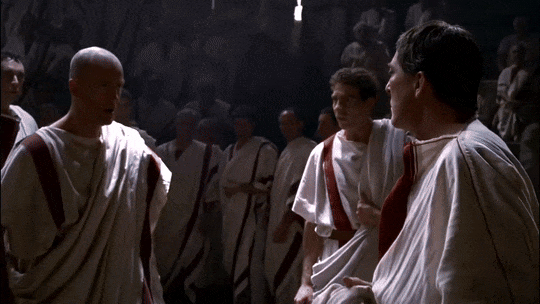
After years of civil war caused by this assassination, his grandnephew Octavian,Caesar Augustus, became the first Emperor of Rome. Unlike his uncle and adoptive father, Octavian was very vengeful; Within a few years, all of Caesar's adversaries and assassins were dead.
Historians agree that with exceptions, such as Cato, Cicero, Brutus or Cassius,who sincerely believed that the Republic was in danger, the others did not decide to assassinate him out of fear of a monarchy, as they hypocritically claimed, but out of envy and ambition; They did not want to be republicans, they wanted to be JULIUS CAESAR, the same desire of every authoritarian ruler from then to the present.
349 notes
·
View notes
Text
Common Misconceptions About the End of the Roman Republic
Julius Caesar was not born by Caesarean section. Romans only performed that procedure on dead mothers, and Caesar's mother definitely lived another 40+ years.
Julius Caesar was almost certainly not Marcus Brutus' father. He was only 15 years older than Brutus, and Servilia was married to someone else.
Caesar's electoral campaign for 59 BCE was funded by his intended co-consul, Lucius Lucceius, not by Crassus. Although Crassus probably loaned Caesar money at other times.
It is not clear whether Caesar and Pompey used armed intimidation to get their legislation passed in 59 BCE, as neither of them had an army at this time, no contemporary source charges Caesar with political violence during his consulship, and only some of their proposed bills actually passed. See Robert Morstein-Marx's Julius Caesar and the Roman People for more.
Caesar was not an ideologue or demagogue, nor was his legislation particularly radical or populist. He was neither a "voice of the working man" nor a fascist. However, the methods he used to get what he wanted, and his refusal to back down at critical moments, were controversial and sometimes illegal.
Caesar was probably not behind the Vettius affair, considering that Vettius had previously attempted to get Caesar killed.
Caesar was also almost certainly not a member of the Catilinarian conspiracy; in fact, he assisted Cicero's investigation of it.
The "first triumvirate" was not an official group in the same way the second triumvirate was, nor did it overwhelmingly dominate Roman politics. Most of the triumvirs' legislation failed after the first half of 59 BCE, and most of their electoral candidates were unsuccessful.
Caesar didn't conquer all of Gaul, since the Romans already ruled the southern coast and Cisalpine Gaul.
Caesar landed on Britain, twice, but did not conquer it.
The Gauls were not "savages," but a diverse and sophisticated collection of tribes with their own agriculture, political systems, artwork, trade networks and more.
Caesar's Gallic Commentaries are mostly reliable for concrete events and dates, but less so for distances, troop numbers, and people's motivations. The Civil War Commentaries are even more biased.
There was probably no serious threat of Caesar being prosecuted if he entered Rome without imperium. His conquest of Gaul had been highly popular (with the Romans) and his laws had been repeatedly upheld by the Senate. See Morstein-Marx again.
Caesar did not go to war "against the Senate" or "against the republic." The Caesarian and Pompeian factions in the Senate were roughly equal in size, and the overwhelming majority of senators preferred peace over either one.
Caesar did not say "The die is cast" or any variant of it while crossing the Rubicon. He had already sent troops into Italy, and the Senate had begun military action against him over a month before.
The civil war of 49 BCE was caused by a mutual breakdown between Caesar, Pompey, and other factions in the Senate, not solely by one man.
Caesar and Pompey's falling-out was not caused by the death of Crassus or Caesar's daughter Julia, which happened years before any evidence of a rift appeared.
Most of the Pompeians were not fighting "for the republic," and Cicero expected a dictatorship to occur no matter which side won.
Caesar was not the first dictator of Rome, or even its first dictator for life; the first dictator for life was Lucius Cornelius Sulla in 82 BCE.
Caesar also wasn't the first Roman general to march on Rome. That's Sulla again, or possibly Coriolanus if you believe he was real.
There is no evidence that Roman armies considered themselves more loyal to their commanders than to the republic until very, very late in Caesar's civil war, when we first hear of soldiers calling themselves "Caesarians" in Spain. Caesar, Pompey, Marius, and Sulla all had to argue their political legitimacy to their troops before they could make them fight other Romans. See Erich Gruen's Last Generation of the Roman Republic for details.
Caesar was killed in the Theater of Pompey; the Senate house had been burned down years before.
Caesar's last words are unknown, although classical sources suggest "Kai su, teknon?" (You too, my son?), "Casca, what are you doing?" "Why, this is violence!" and silence as possibilities.
Caesar is not usually categorized as an emperor by modern sources, but some ancient writers like Suetonius did.
Augustus was not born in August, but in September.
Octavian never went by Octavian. First he was Gaius Octavius (Thurinus), then Gaius Julius Caesar (Octavianus), then added "Divi Filius" and "Augustus" and eventually replaced the first two words with "Imperator."
Cleopatra probably was not killed by a snakebite. She had much more reliable and less painful poisons available.
Cleopatra was not the last pharaoh of Egypt. The last native Egyptian pharaoh was Nectanebo II, the last Ptolemaic pharaoh was Caesarion (Ptolemy XV), and the last Roman emperor recognized as pharaoh was Maximinus Daza.
Augustus' reputation as a coward comes from his enemies. He fought numerous battles throughout his career, including the two he was accused of ducking, Mutina and Philippi. (He fought in the second confrontation for each one.)
Augustus didn't declare himself ruler of Rome. Although he was de facto the ruler, he was officially just "the first citizen" (princeps), a concept that long predated him.
Although initially patricians were the aristocratic class, by the late republic they made up only a minority of the aristocracy; the rest were wealthy plebeian families.
The Senate could not pass laws on its own during the late republic; its legislation had to be ratified by the People's Assembly.
The Roman government was not as democratic as most modern republics, with much less of the population represented, but it did have some popular influence on government policy, and public demonstrations and protests were common.
Roman politicians do not fit into modern political movements like socialism, fascism, or liberalism, or into stable parties like democrats or republicans. Roman politics was driven mainly by personal alliances and rivalries rather than by ideologies.
Although the "Roman empire" is sometimes used to refer to the period when Rome had emperors, Rome had an empire-like system of provinces, conquest, and tribute as early as after the First Punic War in 241 BCE. Julius Caesar and Augustus initiated a change in how Rome was governed, but they did not create Roman imperialism.
Roman women played an active role in politics, particularly in coordinating marriage alliances, communication networks, advocating on behalf of their families, public protests, and diplomatic negotiations behind the scenes.
The late republic was very ethnically and religiously diverse, with many Roman citizens descended from Greeks, Africans, Gauls, Jews, Iberians, and other groups. Mixed marriages and multilingualism were common.
Romans did not categorize sexuality by gender attraction, and most Roman men would not have identified as what we now call heterosexual. See Roman Homosexuality by Craig Williams for details.
Most famous Roman monuments, like Trajan's column and the Colosseum, date to after republican times. During Cicero's era the city was mostly brick and wood.
Historians do not agree on why, or when exactly, the republic "fell." Not all of them believe it was "doomed," either. It's likely that many connected factors, and random chance, played a part.
Suggested sources for learning more:
SPQR: A History of Ancient Rome, by Mary Beard
Cato the Younger: Life and Death at the End of the Roman Republic, by Fred Drogula
Cicero: The Life and Times of Rome’s Greatest Politician, by Anthony Everitt
Augustus: First Emperor of Rome, by Adrian Goldsworthy
Julius Caesar and the Roman People, by Robert Morstein-Marx
Historia Civilis
The History of Rome podcast by Mike Duncan
Everything on my recommendations page
#putting all these in one place for convenience. may add more as i think of them#jlrrt essays#historiography
142 notes
·
View notes